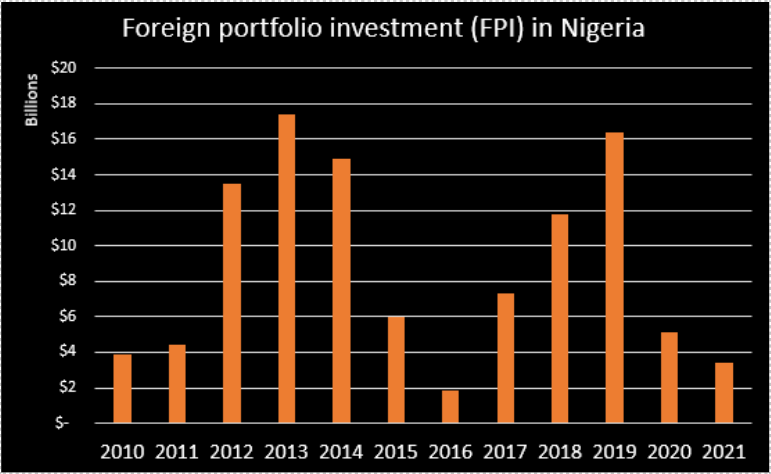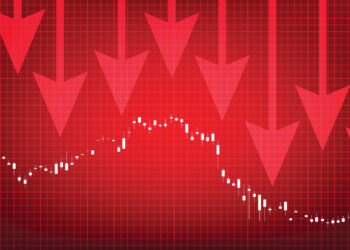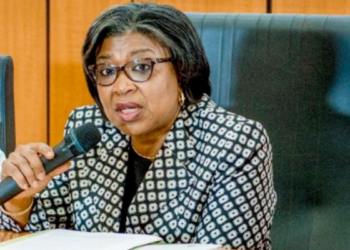Nigeria recorded foreign portfolio investments of $3.39 billion in 2021, dropping by 34% compared to $5.16 billion recorded in the previous year. A cursory glance at the data shows that this is the worst amount of FPI attracted by Nigeria in the past 5 years.
This is according to data culled from the capital importation breakdown of the Central Bank of Nigeria.
Nigeria’s annual foreign portfolio investments have recorded two consecutive years of decline, having dipped by 68.5% in 2020 from $16.38 billion recorded in 2019 to $5.16 billion. It also followed with a 34% year-on-year decline to $3.86 billion in 2021.
What are FPIs
- Foreign portfolio investment (FPI) refers to the purchase of securities and other financial assets by investors from another country.
- These securities or assets could be held directly by the investor or managed by financial professionals.
- Some examples of portfolio investments include stocks, bonds, mutual funds, exchange traded funds, amongst others.
While the downturn in FPI can be attributed to the depressed economic activities following the lockdown and movement restrictions in 2020, which disrupted most markets, it appears that domestic investors are also taking over the local financial market.
For example, data from the Nigerian stock market shows that the contribution of foreign FPI to the portfolio investments in the local market has dropped significantly in recent years.
Notably, contribution of FPIs dropped to 22.9% in 2021 from 33.6%, 48.9%, 50.7% recorded in 2020, 2019, and 2018 respectively.
A total of N1.89 trillion was traded in the local bourse in 2021, which is 12.4% lower than the N2.17 billion recorded in the previous year. A further breakdown of the data shows that a sum of N434.5 billion worth of transactions involved foreign investors, which accounted for 22.9% of the total transaction in the reference period.
The local equities only managed to print a 6.07% gain in its All-Share index in 2021, which is significantly below the country’s inflation rate, failing to meet up with the record-breaking 50% gain recorded in the previous year.
In the same vein, local investors have also stepped up to the federal government securities, oversubscribing the FBN bonds multiple times, despite the low-interest rate regime. Meanwhile, with the low yield in the government securities, it is not expected for foreign investors to bring in their funds into such market.
It is worth noting that Nigeria continues to suffer from a significant dip in foreign investments, both from the portfolio and direct investments, which has affected FX liquidity in the economy. This has also been compounded by the reduction in export earnings, largely due to the decline in crude export revenue and the decline in diaspora remittances.
Backstory
- Recall that Nairametrics reported in the previous week that Nigeria’s foreign direct investments fell to its lowest level in 2021, printing a direct inflow of $698.78 million, which experts have attributed to the low business environment of the country.
- They added that the level of insecurity and inflationary pressure in the country has discouraged foreign investors from putting their monies into the Nigerian economy as returns continue to be eroded by inflation and exchange rate volatility.
- Additionally, Nigeria ranks 131st among 190 economies in the ease of doing business index, which paints a grim picture of the country’s business environment, with inflation surging at record highs exchange rate already trading around N580/$1 at the parallel market and N416/$1 at the official market.

























Good